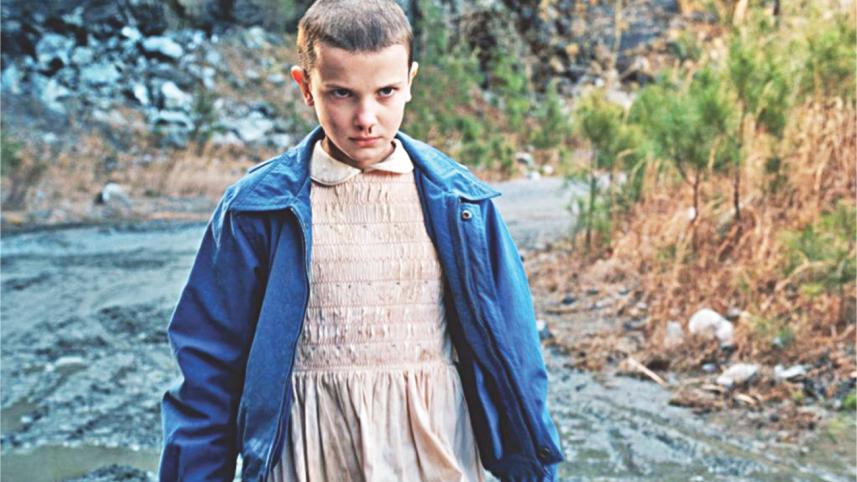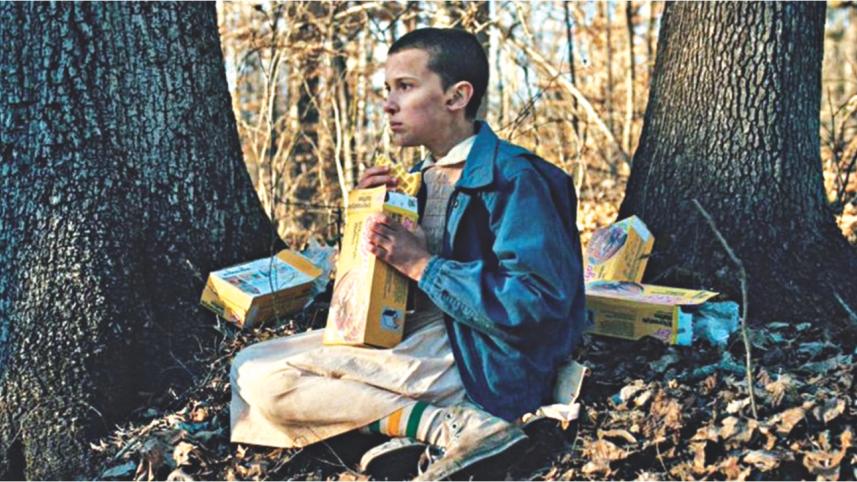The Girl in The Mirror

Makeovers. The very word is a connotation of a life changing moment, after which can only be a future where you walk in slow motion, accompanied by an inspirational, happy, rock tune for a soundtrack. And lots of spiral staircases because how else will a room full of people crane their necks for a good look? Growing up, a makeover was all I had ever wanted, a desire fueled to a passion after having watched movies like “Clueless” or “Princess Diaries.” Thus defined the standards for what is considered feminine and desirable. Even more disturbing is the image portrayed before the transformation; the geeky girl whose social awkwardness comes from her appearance and shyness is a flat, invisible character. Just as how femininity is drawn within rigid lines, the girl in her unfeminine state is formless, yet confined within the single representation used over and over again in film.
Which is why I could not help but rejoice when “Stranger Things” brought Eleven. However my joy was only short-lived until Eleven received her transformation in order to blend in seamlessly. What irked me further was that it had been at the hands of Mike, a boy with whom she sought refuge. Although these were innocent children, it subtly portrays the binary perception of gender instilled within us from childhood. To Mike, “pretty” is recognised within a certain form, which Eleven was able to fulfill after donning the hair, dress and makeup. Eleven's initial appearance had been met with much ambiguity, alluding to her mysterious origins. Before the transformation her encounters with people had been met with confusion and fear as they could not put a finger on how to define her. However the 'pre-feminised' Eleven was also a being that could only exist in hiding; the basement, the hidden room in the lab, the forest through which she was able to roam free with her friends. She existed in secrecy, hidden away by her father-figure, and her friends.
Although the series paid homage to the 1980's in film, and Eleven's nature of origin had been the primary motivation for the discretionary efforts made towards her confinement away from the world, her invisible status echoes the geeks of romantic comedies and other films. It also reflects our cultural understandings of compulsory hetero-normativity where social standards of beauty and feminine identity is the only accepted form of woman, and anything different must be 'changed' or 'cured.' For a long time in history, these 'misfits' have been represented within literary texts as the madwoman, or the hysterical woman, who must be confined within a room, or more famously in Charlotte Bronte's “Jane Eyre,” the attic and the fearsome Red Room, so that the world is safe from her histrionics. Before television, books had been the medium of the feminine portrayal of women, who serve as the angels of the house, only to be replaced now by the sweet, beautiful heroines whose transformation is imperative in order for her male lover to take an interest. The male gaze in these films is also the audience's gaze, as we recognise what we see now is beautiful, and accepted.

Although there was no spiral staircase for Eleven to descend from, there was a mirror through which she meets her new self. Jacques Lacan's theory of the mirror stage describes a phase where the infant learns to recognise his or her image in the mirror, and learns that the image projected within the reflection is not merely the 'self,' but also the subjective self the world sees. This creates a duality between the ego and the body, as well as the Imaginary and The Real. For the women in makeover scenes, the mirror image also brings about another development; the recognition of the self as a sexual being, a being that must be feminine in order to appear desirable and to act upon one's own desires.
Eleven later ditches her blonde wig upon discovering it does little to deter her powers, and she roams free creating chaos in her wake. Although Mike's affections for her were still retained, it cannot be ignored that his feelings came into awareness once the transformation had been made. Even without the wig, the viewers cannot shake off the potential Eleven had to be 'pretty,' and that had been enough to forgive her appearance later on. Although “Stranger Things” did a magnificent job in bringing body politics into attention, we must realise the only way women can reverse this, in Virginia Woolf's words, would be to “kill the aesthetic ideal through which they themselves have been 'killed' into art.”
Photos: Internet



 For all latest news, follow The Daily Star's Google News channel.
For all latest news, follow The Daily Star's Google News channel.
Comments